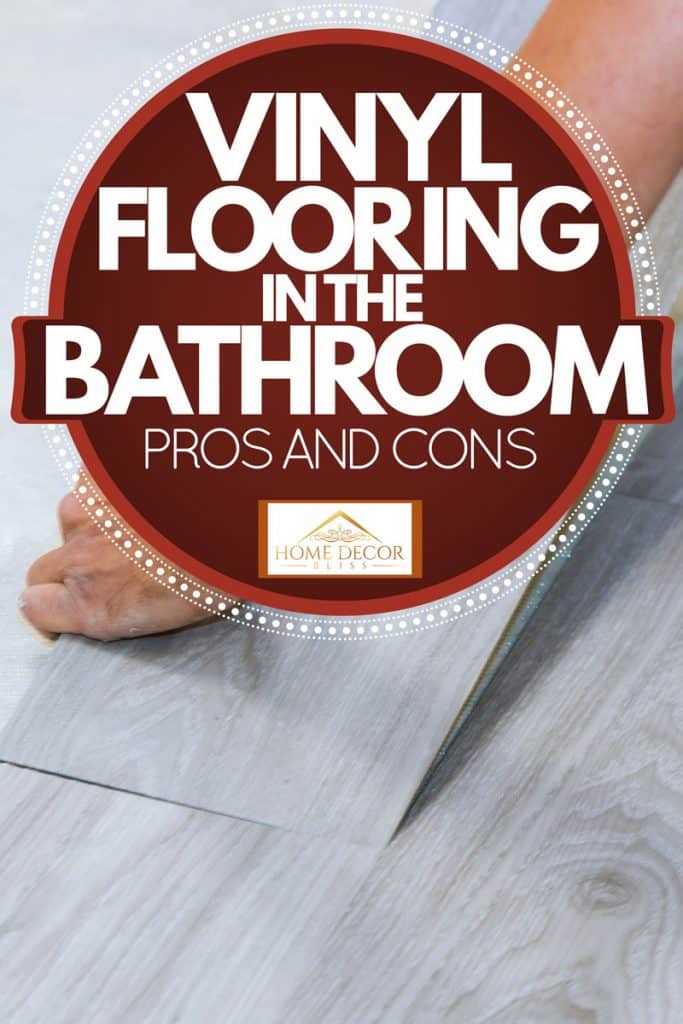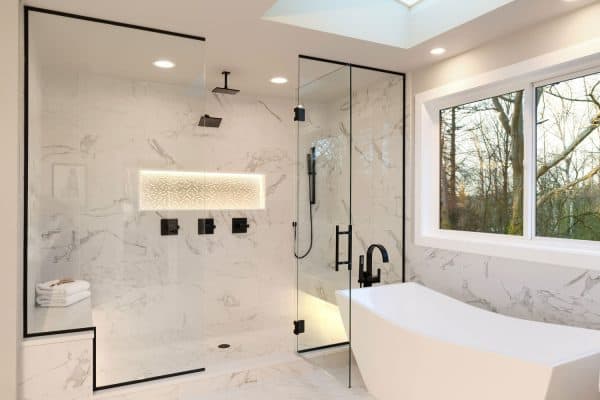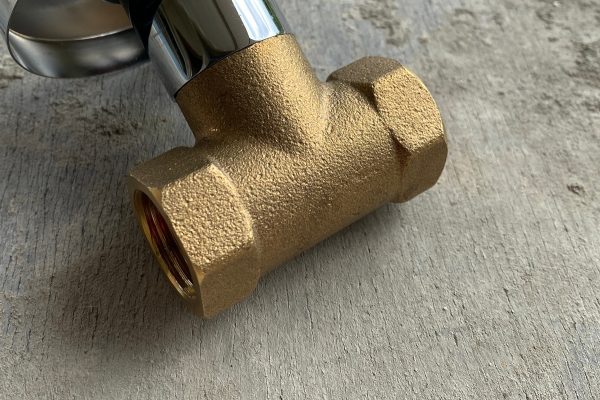When redoing the flooring in your bathroom, you may be considering many options. If vinyl flooring is one possibility, you may wonder if it is a good choice for a bathroom and what benefits and downsides it may have. We've done the research and found answers for you.
Vinyl flooring in a bathroom has many pros and few cons. There are different types of vinyl flooring, but in general, the pros are:
- Low cost
- Easy to clean
- Comfortable underfoot
- Low maintenance
- Water-resistant
- Variety of styles and colors
- Easy to install
- Stain-resistant
Vinyl flooring's cons include:
- Can be hard to remove
- Durability
- Not recyclable
- Can produce unpleasant odors
It is important to weigh these pros and cons carefully when selecting your flooring. If, in your opinion, the pros outweigh the cons, then vinyl flooring could be a good choice for your bathroom. We go into more detail on these pros and cons and discuss the different types of vinyl below to help you make an informed decision, so please keep reading.

Vinyl Flooring In A Bathroom - Pros & Cons
Vinyl flooring has been used in bathrooms for a very long time. There are two main types of vinyl flooring: standard vinyl and luxury vinyl. Each has different properties that you should take into account. Both are very versatile in that they handle wet areas well, come in various styles, and are simple to install. Below we list the pros and cons that both types share.
Pros Of Vinyl
Low cost
The cost of vinyl is much less than stone, ceramic, and most other flooring options. The luxury vinyl is more expensive than the standard vinyl, but it is still usually more affordable than other options like porcelain or ceramic tile. This is especially true when you consider the cost of labor and materials needed to install the flooring.
Easy to clean
Vinyl is very easy to clean since it is usually a relatively smooth and well-sealed surface with no grout lines. A damp mop with or without a mild, non-abrasive detergent will often be sufficient.
Comfortable underfoot
Vinyl usually has a bit of softness to it, and you can feel that under your feet. This is in contrast to the hardness you feel on other types of tile. The vinyl also has a warmer feel to it and is a better insulator than other tiles. This can be very noticeable in a bathroom, particularly on bare feet.
Low maintenance
Unlink some other tiles vinyl does not need to be resealed and does not usually have grout that is difficult to clean and maintain. In a damp area like a bathroom, this is especially helpful to maintain cleanliness.
Water-resistant
Splashes and drips like those typical in a bathroom cause no problems with vinyl if installed properly, and large puddles are not left for extended periods of time. Water will not harm vinyl. It will not absorb water, and water will not damage it. But if water stands on top of vinyl flooring, it may seep past the seams and into the subfloor. This can damage the subfloor or lead to mold.
Easy to install
Most people find it much easier to install vinyl than other types of flooring. You can attach vinyl flooring with flooring adhesive, or it may have a self-stick adhesive back. Other vinyl may be a click-together floating system, where the tiles attach to each other and do not adhere to the floor. The floating style may require an underlayment, but other than that, the only other preparation necessary before installation is to make sure the floor is even and smooth, with no nails or screws protruding.
Stain-resistant
Vinyl resists stains that would be difficult to remove on other types of flooring. Part of this is because of the smooth, water-resistant surface of the tile. The usual lack of grout lines also helps to avoid stains.
Cons of vinyl
Can be hard to remove
This applies to the glue-down tiles, not the floating floor systems. The glue can make it hard to pull up from the subfloor, and the thinner tiles can break apart as you try to remove them. It can also be difficult to remove a tile to replace it, should a tile become damaged.
Durability
While the luxury vinyl is much more durable than standard vinyl, both types are much less durable than ceramic or porcelain. Both will wear down over time. With both types of vinyl, any heavy or poking items may damage them. This is usually not a problem in a bathroom, but something to keep in mind.
Not recyclable
Unlike some other types of flooring, vinyl is not recyclable. This means it will go into a landfill when removed.
Can produce unpleasant odors
Many people report an unpleasant odor coming from the vinyl flooring, especially when first installed. This odor does dissipate eventually but should be a consideration for how well you'll adjust to the your new installation.
Now let's discuss the specifics of each type of tile.
Styles of Vinyl Flooring For Bathrooms
Standard Vinyl
This is what comes to mind for a lot of people when they think of vinyl flooring. It is the kind you often see in hallways in hospitals and schools or find in the restroom at the library. These are usually thin tiles, sometimes peel and stick and sometimes glue-down.
The main difference to consider with the standard vinyl is that it is not nearly as durable as the luxury vinyl, and it is much more prone to becoming brittle along the edges as it ages. In bathrooms, heat cycling -- which can occur during hot showers -- may cause gaps at the seams, as well. These tiles sometimes curl up at the edges as they age and wear. Standard vinyl usually does not have as many choices available in style and color as luxury vinyl does.
Achim Home Furnishings Spanish Rose Vinyl Tile
We may include affiliate links and curated AI content to highlight top design styles.
Click here to see this tile on Amazon.
FloorPops Medina Floor Vinyl Tile
Click here to see this tile on Amazon.
Luxury Vinyl
Luxury vinyl is much more durable than standard vinyl, and it comes in a larger variety of colors and styles. It is available in finishes that can mimic stone, wood, and other tiles. At times it can be difficult to tell the difference, by look alone, between luxury vinyl and more expensive tiles.
Some people install luxury vinyl with grout between the tiles, which negates many of the stain-resistant and water-resistant benefits vinyl usually has and may require regular application of a sealer at grout lines, especially in a bathroom. Additionally, if it is a floating floor system, water is much more likely to seep past the edges and underneath.
Turtle Bay Stoneridge Gray Travertine-Look Tile
Click here to see this tile on Amazon.
Lucida Wood Luxury Vinyl Planks
Click here to see this tile on Amazon.
Is Vinyl Flooring Waterproof?
Vinyl flooring is waterproof, but that doesn't mean you should let water stand on it for extended periods of time. It is possible for water to seep past the edges and get between the vinyl and the subfloor underneath. This could damage the subfloor or cause mold growth.
Can Vinyl Flooring Look Like Tile?
Some vinyl flooring can look much like porcelain or ceramic tile. There is vinyl flooring that looks like wood, concrete, slate, and marble as well. While the lower-cost vinyl flooring is not as convincing with its look, the design and texture of luxury vinyl can make it very difficult to tell that it is not porcelain, concrete, sandstone, or other expensive tiles.
Does Vinyl Flooring Need Underlayment?
You do not always need an underlayment on vinyl flooring. If you glue down your vinyl flooring, then you won't want an underlayment. The underlayment is for the interlocking, floating floors.
If you are laying a floating vinyl floor over concrete, you should always use an underlayment. This is because it acts as a necessary vapor barrier between the vinyl and the concrete.
In some cases, underlayment may be optional. While it isn't always necessary over wood or tile, you may still want an underlayment because of its sound deadening qualities. It will also add a little cushioning to the floor.
Conclusion
Vinyl can often make a good choice for a bathroom. It is water-resistant, warmer underfoot than hard tiles, and easy to clean. However, vinyl on the floor does not completely water-proof it. You should still dry any standing water as soon as you can or risk damage to your subflooring since moisture may seep past the vinyl at the seams.
You may also enjoy reading:
What Is The Best Flooring For A Small Bathroom? [6 Great Options!]




![Marble walled shower wall, 5 Best Types Of Shower Wall Panels To Consider For Your Bathroom Renovation [The Ultimate Guide]](https://homedecorbliss.com/wp-content/uploads/2023/07/shutterstock_2138160219-600x400.jpg)

